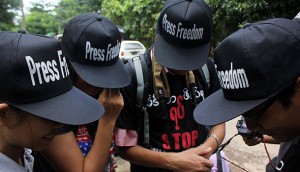Upper House of Parliament Must Reject the Printing and Publishing Enterprise Law
By Burma Partnership • July 8, 2013 On 4 July, the Lower House of Parliament approved the controversial Printing and Publishing Enterprise Law despite strong opposition and criticism by the interim Myanmar Press Council, local media and freedom of expression watchdogs.
On 4 July, the Lower House of Parliament approved the controversial Printing and Publishing Enterprise Law despite strong opposition and criticism by the interim Myanmar Press Council, local media and freedom of expression watchdogs.
The Ministry of Information introduced the draft law in Parliament last March, a week after the Press Council released its own draft Media Law. This came as a surprise as the Ministry’s draft was written in secrecy, presented to the Parliament before any consultation took place and happened despite an earlier agreement that the Press Council would be in charge of drafting the new media legislation.
As a reaction to this clear attempt by the Ministry to bar the Council’s legislation from being presented to the Parliament, local and international media loudly opposed the Printing and Publishing Enterprise Law. The Committee to Protect Journalists said, “If passed in its current form, the draft law will essentially replace Burma’s old censorship regime with a similarly repressive new one.” Article 19 called for the draft law to be withdrawn or rejected by the Parliament “as it would be a major step backwards for freedom of expression and freedom of the media, restoring prior censorship and full governmental control over the press.”
The Ministry’s draft does not recognize the right to freedom of expression. It very broadly defines who the law applies to, for instance the definition of “publication” is so broad that posters and emails would be subject to the bill. In addition the bill places “publications,” “publishers,” etc. under the “authorization” and “control” of the government while media should be independent from governments. The bill creates a pre-censorship system by requiring printers and publishers to get a “certificate of registration” from the government, enabling the government to refuse applications from critical voices. It also prohibits speech in a vague way, such as speech that is against the rule of law or the constitution, and includes large and disproportionate sentences for non-compliance with the legislation.
Despite strong opposition, the Lower House of Parliament adopted the Ministry’s draft with only small and minor amendments. It ended the possibility of a jail sentence for journalists who did not comply with the strict regulations of the law. However, the changes were not deemed sufficient: “During negotiations with the Ministry of Information, we pointed out clauses [that would limit press freedom] and we learnt that those clauses were still included in the draft law that was approved by the Lower House today,” said Zaw Thet Htwe, a member of the Press Council.
The adoption of the draft by the Lower House revived the opposition to the bill by journalists and the Press Council. “Since that bill came out, it has been protested. […] The Ministry of Information has never been transparent. They are not honest. Also in this case, I think they got their own way,” said Chit Win Maung, another member of the Press Council.
First praised as one of the most significant areas of progress and change in transitioning Burma, media freedom is now backtracking. Beyond the immediate threat that the adoption of the government’s Printing and Publishing Enterprise Law represents, media freedom is facing many challenges including issues related to the coverage of sensitive topics such as anti-Muslim violence or the situation in ethnic nationality areas, the inclusion of publication in local ethic languages, journalistic ethics and self-censorship.
The draft law still has to be passed on to the Upper House of Parliament for approval. As it is now clear that the government is trying to maintain its grip on media and to restrict freedom of expression, it is up to the MPs to stand up as freedom’s defenders. The Upper House of Parliament must simply reject the government’s draft law. If adopted, the law would become one of the most serious obstacles to Burma’s transition to a free and democratic country.
Tags: Burma Partnership, Censorship, Media Freedom, Printing and Publishing Enterprise LawThis post is in: Blog
Related PostsBurma Partnership Celebrates Continuing Regional Solidarity for Burma and Embraces the Work Ahead for Progressive Voice
Burma Army Displays Blatant Disregard for 21st Century Panglong Peace Process
Ann Din Coal Power Plant: Local Movement and Action to Preserve and Protect Natural Resources and Land: Mon IDP Report Case Study #4
Latest Human Rights Abuse Case Demonstrates Urgent Need to Reform the Myanmar National Human Rights Commission
Human Rights Far From Guaranteed as US Sanctions on Burma Are Removed









 All posts
All posts